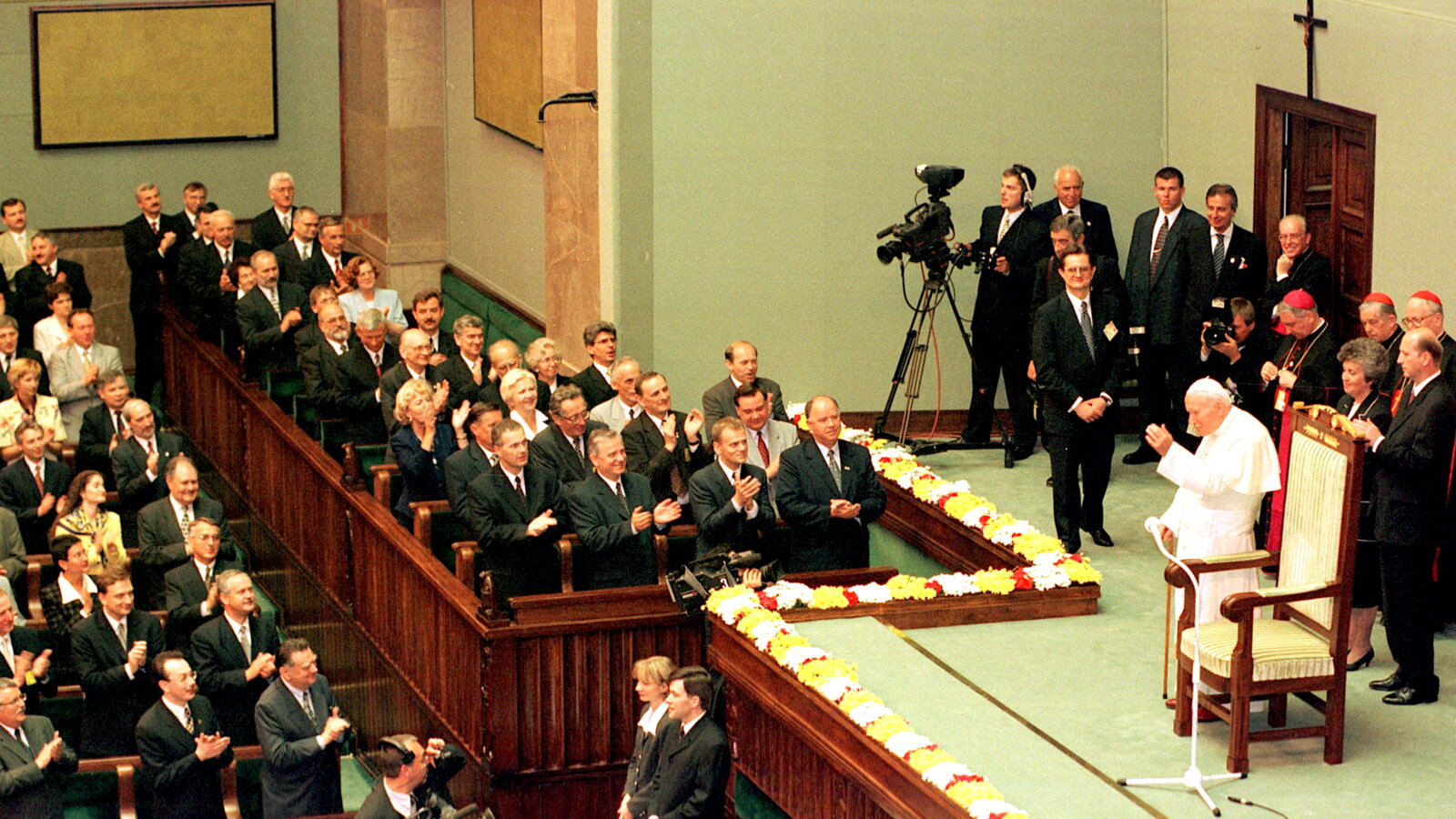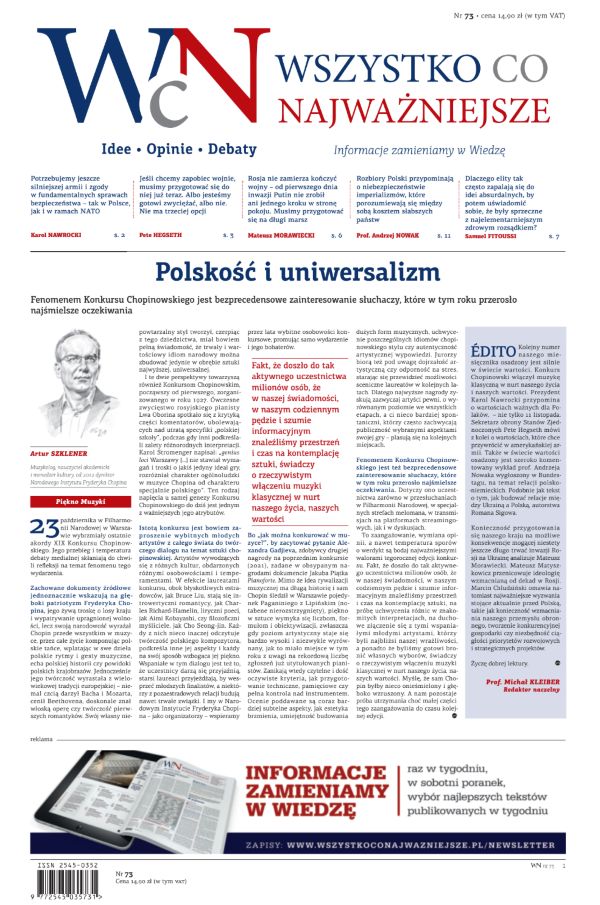
 Saint John Paul II – The Great Bridge Builder
Saint John Paul II – The Great Bridge Builder
‘The word “pontificate” derives from the traditional papal title Pontifex, Builder of Bridges. This symbolic term is perhaps one of the most important keys to a deeper understanding of John Paul II’s rich legacy,’ writes Andrzej DUDA
.‘What a road we have travelled!’ This spontaneous remark by Pope John Paul II, made during his historic 1999 visit to the Parliament of the Republic of Poland, has become a symbol and continues to inspire reflection. It hits the mark, providing a synthesis of his extraordinary pontificate, the fate of Poland and its people, and the history of the contemporary world. Today, on the 105th anniversary of St John Paul II’s birth and a month and a half after the 20th anniversary of his death, let us reflect on the message contained in this remark.
To properly understand it, we need to know the full context. John Paul II referred to the words of the Polish national anthem, which was written in 1797, when our country disappeared from the map of Europe, divided between three partitioning powers. At this critical time, General Jan Henryk Dąbrowski organised the Polish Legions formed from patriots in exile in Lombardy, Italy. With ‘Free men are brothers’ emblazoned on their uniforms, this army represented the spirit of freedom and ignited our nation’s hope for independence. The uplifting song Jeszcze Polska nie umarła, kiedy my żyjemy (Poland has not yet died, as long as we remain), written especially for them, became the Polish anthem.
Two hundred years later, in the Parliament building of the independent Republic, our great compatriot, returning to his homeland on an apostolic journey from the Vatican, invoked its refrain: ‘March, march, Dąbrowski, from Italy to Poland.’ He then jokingly added, referring to his white cassock, a sign of papal dignity: ‘No one thought it would be in such attire. What a road we have travelled!’
Yes, history sometimes accelerates in ways that are difficult to imagine. John Paul II left a powerful, indelible mark on historical change. Elected on 16 October 1978, he was the first non-Italian head of the Church in over 450 years. Even more significant was the fact that he undertook his papal mission having come from behind the Iron Curtain that divided Europe during the Cold War. For the Poles and all other nations under Soviet domination, it was an extraordinarily momentous event that brought joy and hope. The world was frozen in surprise, not sure what would happen next. Soon, however, we would experience a true phenomenon: the era of John Paul II. During the papacy of the foreign-born Pope, nearly everything was novel and groundbreaking.
The word ‘pontificate’ derives from the traditional papal title Pontifex, Builder of Bridges. This symbolic term is perhaps one of the most important keys to a deeper understanding of John Paul II’s rich legacy. Our great compatriot – this remarkable shepherd of souls, theologian, philosopher, mystic, artist, statesman and visionary – dedicated himself with ardent faith not only to strengthening the Catholic community but also to building bridges between people of different religions, nations and cultures. He was particularly predestined for this mission. He was one of the advocates of the Church’s opening to the world, an approach adopted at the historic Second Vatican Council. He had lived through, and would never forget, the twin tragedies of two totalitarianisms – brown and red – which propagated hatred and disdain for their perceived enemies through the ideological madness of chauvinism, racism and class warfare. At the same time, he carried in his heart the beautiful heritage of the Many-Nations Commonwealth of the 14th to 18th centuries – a vast state created not by conquest but by political agreement between the peoples of central Europe, based on the principles of parliamentarism, democracy and tolerance. The Polish Pope even saw this former Commonwealth as the predecessor of today’s European Union. It was these experiences and convictions, combined with his deep faith and spiritual strength, that enabled John Paul II to achieve his spectacular historical victories.
History has discredited the taunting question posed by Stalin with imperial arrogance: ‘How many divisions does the Pope have?’ Naked violence proved impotent in the face of the evangelical message ‘Do not be afraid!’ that John Paul II proclaimed at his inauguration and that guided his actions for almost 27 years of papal ministry. He contributed enormously to the fall of communism, the liberation of Poland and other Central and Eastern European countries, the collapse of the Soviet empire of evil, the overcoming of divisions and the unification of Europe.
The legacy of the Bridge Builder, the Pope of Freedom and Solidarity, continues to inspire people to see others first as fellow human beings and search relentlessly for that which brings all of us together and makes the world a better place. John Paul II crossed all borders, thresholds and barriers with inexhaustible energy. During his 104 international apostolic journeys, along with frequent trips within Italy, he visited 129 countries around the world, bringing the message of peace even to places plagued by tension and conflict. We Poles will always cherish the memory of the Pope’s nine pilgrimages to his homeland – each one a spiritual feast. He was an advocate of ecumenical understanding and the first head of the Catholic Church to enter a synagogue and a mosque to show respect for the other great monotheistic religions. He has led the Church into the third millennium, unafraid to admit its historical failings and errors. He encouraged dialogue between faith, science and culture. He also left a rich legacy of teaching on the Christian understanding of a human as a person, the vision of marriage and family, the dignity of human labour, patriotism and the ethical dimension of politics and international relations. In these challenging times, let the 1995 address to the United Nations by the Polish Pontiff resound in our consciousness: ‘We must overcome our fear of the future. But we will not be able to overcome it completely unless we do so together.’
.I truly believe that the 105th anniversary of the birth of Karol Wojtyla, Saint John Paul II, will unite all people of good will in the common quest for a better future. It is not only we Poles but also our countless brothers and sisters throughout the world who remember the moving experiences of our meetings with the Pope. We remain deeply appreciative of the wisdom and encouragement he has given us. I am convinced that the call to spiritual renewal proclaimed by our great compatriot does not belong to the past but always points to the future. Let us follow this guidance so that in the decades to come, we can repeat after him with joy, confidence and pride: ‘What a road we have travelled!’



